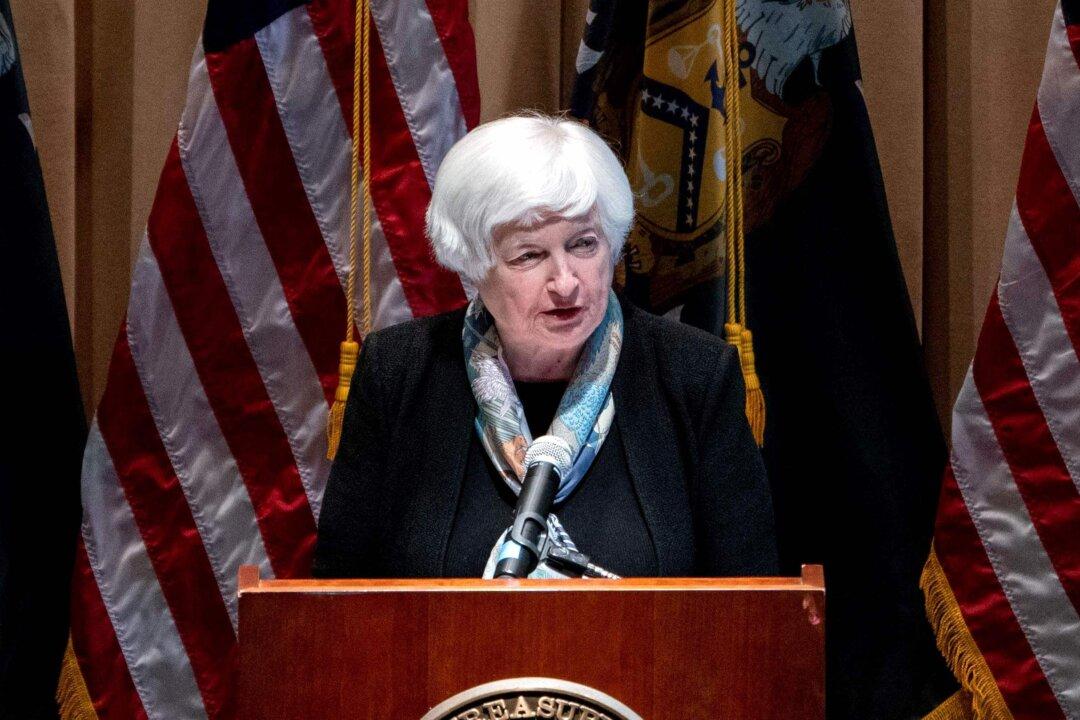The American people are better off today despite rampant price inflation over the past few years, Treasury Secretary Janet Yellen told House lawmakers on April 30.
Ms. Yellen appeared before the House Ways and Means Committee to outline President Joe Biden’s 2025 budget and defend the administration’s economic record.
When pressed on the reacceleration in price pressures, the senior White House official explained that inflation has decreased significantly over the past year.
“So people generally are better off in spite of the price increases,” she told lawmakers. “But we know we have more work to do, and President Biden is very focused on areas where he can lower costs.”
Ms. Yellen uttered similar comments in a “CBS Evening News” interview in February, purporting that “American workers are getting ahead.”
“We know that Americans are experiencing discomfort because some important prices are higher than they were pre-pandemic,” she said. “But what I think is really important is that wages have gone up along with prices, so people are better off than they were pre-pandemic.”
Since 2021, cumulative inflation has totaled approximately 19 percent.
In her testimony to the committee, Ms. Yellen alluded to the Federal Reserve’s preferred inflation gauge—the personal consumption expenditures (PCE) price index—as evidence that conditions have stabilized. Despite rising to a higher-than-expected 2.7 percent in March, it is down from the June 2022 peak of 7.1 percent.
Core PCE, which strips the volatile energy and food sectors, was unchanged at 2.8 percent last month.
While acknowledging that households are not seeing prices of goods and services come down to their pre-pandemic levels, many people are seeing higher wages, referencing the latest wage data.
However, on an inflation-adjusted basis, compensation was little changed.

Real average hourly wages are down by 2.7 percent since January 2021.
Still, the public is doing well, according to Ms. Yellen.
She pointed out that the Inflation Reduction Act, for example, targets a wide array of components contributing to higher living costs, such as drug prices, health care premiums, and household energy costs.
While speaking at a Utah fundraiser in August 2023, President Biden conceded that his landmark legislation had little to do with fighting inflation.
Tax Policy
Republicans focused on tax policy, accusing President Biden of raising taxes on many Americans, including those who earn less than $400,000.In 2017, then-President Donald Trump enacted the Tax Cuts and Jobs Act, legislation that reduced the top individual income tax bracket from 39.6 percent to 37 percent and raised the threshold for several income tax brackets, reducing the liability for many households.
President Biden has said that he will allow the tax cut to expire in 2025.
“Donald Trump was very proud of his $2 trillion tax cut that overwhelmingly benefited the wealthy and biggest corporations and exploded the federal debt,” President Biden wrote in a post on X, formerly known as Twitter, on April 25. “That tax cut is going to expire. If I’m reelected, it’s going to stay expired.”
Economists say letting the tax law sunset would result in most Americans facing higher tax bills.
“If lawmakers allow full expiration to occur, most Americans will see their personal tax bills rise and incentives for working and investing worsen,” Erica York, senior economist and research director at the Tax Foundation, said in a January 2024 report.
Rep. Ron Estes (R-Kan.) offered estimates of potential tax hikes should President Trump’s initiative expire.
“I did some quick calculations, but basically what that means is that there’s going to be a 25 percent increase in the tax rate on people that make less than $44,000,” he said. “There’s going to be an additional $14,000 tax increase on people making less than $95,000, and an additional increase on others making $400,000.”
Inflation Reacceleration
This year, leading inflation metrics have reaccelerated, sparking concern that the U.S. economy could be on the brink of another wave of price pressures.The consumer price index, for instance, rose to 3.5 percent in March.
Even the Fed’s preferred inflation gauge has been traveling in the wrong direction.
The three- and six-month annualized core PCE spiked last month to 4.4 percent and 3 percent, respectively.
The public is becoming more skeptical that fiscal and monetary policymakers are making gains in their war on inflation.
The University of Michigan’s one- and five-year-ahead inflation expectations rose to 3.1 percent and 3 percent, respectively.
Average 12-month inflation expectations in The Conference Board’s latest consumer confidence index were little changed at 5.3 percent.
Economists assert that various contributors to the upward inflation trajectories have been involved, including higher energy prices, ballooning housing costs, loosening financial conditions, and the nation’s monetary supply hitting a one-year high.
Crude oil prices have risen by 15 percent year to date, while the average cost for a gallon of gas is higher than a year ago at $3.65.
Housing affordability remains an exceptional challenge for millions of Americans.
According to the Federal Housing Finance Agency, house prices rose by 1.2 percent in February, month-over-month, and by 7 percent year-over-year.
This is in addition to higher mortgage rates. The 30-year fixed-rate mortgage firmed above 7 percent for the second straight week, Freddie Mac data show.
Overall, according to Redfin data, the typical monthly mortgage payment of a median-priced home is more than $2,800.
Figures from the Federal Reserve Bank of Chicago show that financial conditions have been dramatically loosening since the second quarter of 2023, fueled by expectations that the central bank would be cutting interest rates heading into 2024.
The Fed’s money supply creation is at a one-year high.
As a result of recent trends, consumer sentiment is beginning to deteriorate after climbing since November 2023. The University of Michigan’s consumer sentiment index was revised lower in April as “consumers continue to express uncertainty about the future trajectory of the economy.”







